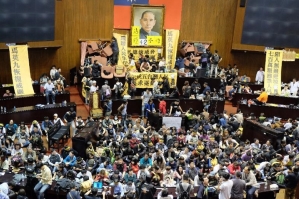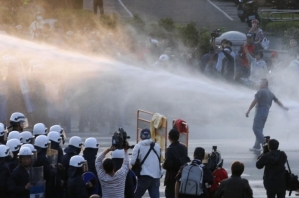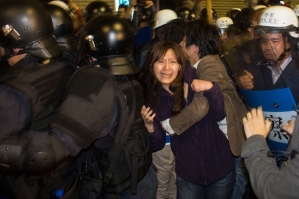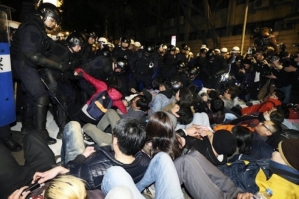
Taiwanese student protest leaders who have occupied parliament building have accepted President Ma Ying-jeou's offer to meet for a dialogue about the controversial trade deal with mainland China.
The students announced their decision on Tuesday at the parliament, according to Al Jazeera news. The contested trade deal would open 80 of China's service sectors to Taiwan, and 64 Taiwanese sectors to China.
Without setting any preconditions, Ma is offering the student leaders a chance meet, where both parties can explain their perspectives and hopefully reach a peaceful agreement on the impasse over the cross-strait services trade agreement, according to a statement released by Lee Jai-fei, Ma's spokesperson.
Ma's offer came just after protesters occupying Taiwan's government headquarters or Executive Yuan were forcefully evicted by Taipei police on Monday morning. The clash resulted in the injuries of 174 people, including 119 police officers, as police wielded wooden clubs and high pressure water cannon.

Ma's government have been largely tolerant of protesters when they occupied the parliament building, but could tolerate no longer when hundreds of protesters stormed the Executive Yuan building on Sunday evening, shortly after Ma dismissed their demands to scrap the trade agreement with China and denounced the "illegal" occupation of government buildings by students opposed to its ratification.


The demonstrators are pushing for a further review of the Trade in Services Agreement (TiSA), a deal signed in Shanghai last year. Most of the demonstrators are young and their methods are largely peaceful.
The mostly student protesters say the deal hands too much influence to China, is undemocratic and will hurt the island. The government insists it is an economic imperative.
In his address to the demonstrators on Sunday, Ma applauded their passion but questioned the decision to occupy government offices. "Is this sort of democracy we want?" he asked, according to Time. "Must the rule of law be sacrificed in such a manner? Do we not take pride in our democracy and our respect for rule of law?"
Ma and his government say the trade deal will bolster economy and keep Taiwan competitive with countries like South Korea.
On Sunday, he defended the pact with China - the island's biggest trade partner - and said that it would benefit the economy and create jobs for young people.
"Regional economic integration is an unstoppable global trend. If we do not face this and join in the process, it will only be a matter of time before we are eliminated from the competition. For the sake of the nation's development, we truly have no choice," Ma said, according to CNN.
Some Taiwanese believe that parts of the agreement are beneficial to Taiwan's future, but many objected by what they believe were procedural errors in passing the pact, Kumointang's bypassing the agreement to review the trade pact clause by clause. In addition, some believe that this new trade deal would only benefit the large businesses, but hurt the local small businesses throughout the island of 23 million people.
"We feel that the content of the agreement was developed in 'black box' negotiations," student protest leader Lin Fei-fan said, according to CNN.
"The opinions of workers were not consulted and it was passed without deliberation. This is against our democratic principles."
"Spread propaganda and ignore the opinion of the public, this is neither democracy nor rule of law," Lin changed from the rostrum of the occupied legislature on Sunday.
According to Time, the reactions has been somewhat muted from China's widely popular microblogs. Most posts that made it through the censors were critical: "This isn't the democracy we want," was the refrain.
The student occupying the legislature said they will continue their protest until the trade bill is returned to committee for an itemized review, and they have asked for passage of a law that will allow for closer scrutiny of agreements with China, according to NYT.
The government faces broadening concerns, as some student groups have now called for a work and school strike across this self-governed island of 23 million to allow more to attend the demonstrations in Taipei, the capital, according to NYT.






